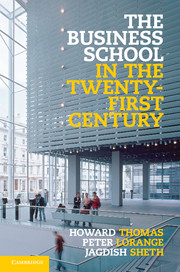Book contents
- Frontmatter
- Contents
- List of figures
- List of tables
- Preface: Tipping or tripping? The business school and its dilemmas
- Acknowledgements
- 1 The business school: history, evolution and the search for legitimacy
- 2 Business school identity and legitimacy: its relationship to the modern university and society
- 3 Rethinking management education and its models: a critical examination of management and management education
- 4 A framework for re-evaluating paradigms of management education
- 5 Evaluating new and innovative models of management education
- 6 Is the business school a professional service firm? Lessons learned
- 7 Enhancing dynamic capabilities in the business school: improving leadership capabilities in curricula and management
- 8 Afterword: business school futures
- Index
- References
2 - Business school identity and legitimacy: its relationship to the modern university and society
Published online by Cambridge University Press: 05 July 2013
- Frontmatter
- Contents
- List of figures
- List of tables
- Preface: Tipping or tripping? The business school and its dilemmas
- Acknowledgements
- 1 The business school: history, evolution and the search for legitimacy
- 2 Business school identity and legitimacy: its relationship to the modern university and society
- 3 Rethinking management education and its models: a critical examination of management and management education
- 4 A framework for re-evaluating paradigms of management education
- 5 Evaluating new and innovative models of management education
- 6 Is the business school a professional service firm? Lessons learned
- 7 Enhancing dynamic capabilities in the business school: improving leadership capabilities in curricula and management
- 8 Afterword: business school futures
- Index
- References
Summary
INTRODUCTION
In the modern university the business school is currently valued much more for its managerial expertise, cash-generation abilities and financial strength than its intellectual vigour and scholarship (Bok, 2003; Starkey and Tempest, 2008). Indeed, as indicated earlier, the legitimacy of business as a serious academic discipline is critically questioned by scholars in science, arts and the humanities (see, for example, Nussbaum, 1997). Further, with the mindset of the corporate university and corporate managerialism as fashionable metaphors for the commercialisation of higher education, many university critics (Bok, 2003; Angus, 2009; Menaud, 2010) have berated university presidents for abandoning the fundamental ideals and visions of universities as ‘thinking institutions’ and generators of knowledge.
They argue that university presidents have instead championed business schools and commercial relevance as criteria for university success and growth while ceding the values of the traditional, elite university to marketisation, market values and financial stability.
- Type
- Chapter
- Information
- The Business School in the Twenty-First CenturyEmergent Challenges and New Business Models, pp. 52 - 89Publisher: Cambridge University PressPrint publication year: 2013



